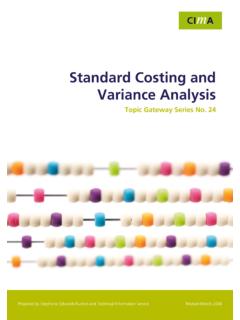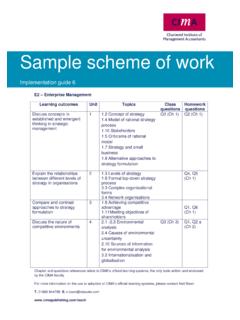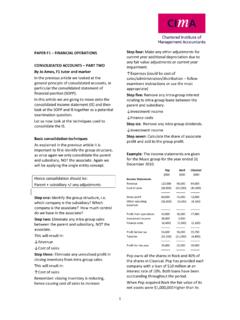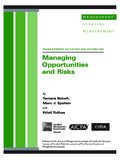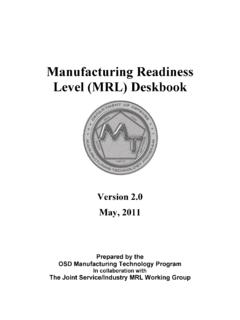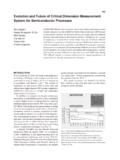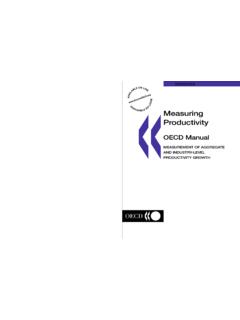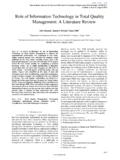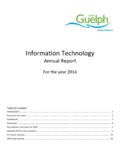Transcription of Performance Measurement - CIMA
1 Topic Gateway Series Performance Management Performance Measurement Topic Gateway Series No. 9. 1. Prepared by Jasmin Harvey and Technical Information Service Revised March 2008. Topic Gateway Series Performance Management About Topic Gateways Topic Gateways are intended as a refresher or introduction to topics of interest to CIMA members. They include a basic definition, a brief overview and a fuller explanation of practical application. Finally they signpost some further resources for detailed understanding and research. Topic Gateways are available electronically to CIMA Members only in the CPD. Centre on the CIMA website, along with a number of electronic resources. About the Technical Information Service CIMA supports its members and students with its Technical Information Service (TIS) for their work and CPD needs. Our information specialists and accounting specialists work closely together to identify or create authoritative resources to help members resolve their work related information needs.
2 Additionally, our accounting specialists can help CIMA. members and students with the interpretation of guidance on financial reporting, financial management and Performance management, as defined in the CIMA. Official Terminology 2005 edition. CIMA members and students should sign into My CIMA to access these services and resources. The Chartered Institute of Management Accountants 26 Chapter Street London SW1P 4NP. United Kingdom T. +44 (0)20 8849 2259. F. +44 (0)20 8849 2468. E. 2. Topic Gateway Series Performance Management Definition and concept Performance Measurement has been widely defined in the wealth of literature on this subject. Two definitions are used to define the concept in relation to management accounting. 'The process of assessing the proficiency with which a reporting entity succeeds, by the economic acquisition of resources and their efficient and effective deployment, in achieving its objectives.
3 Performance measures may be based on non-financial as well as on financial information.'. CIMA Official Terminology, 2005. 'The process of developing measurable indicators that can be systematically tracked to assess progress made in achieving predetermined goals and using such indicators to assess progress in achieving these goals.'. Interoperability Clearinghouse Glossary of Terms, 2005. In the current syllabus, CIMA students will learn and may be examined on this topic in paper P1 Management accounting Performance evaluation'. and paper P6 Management accounting business strategy'. Related concepts Activity based management; the Balanced Scorecard; benchmarking;. budgeting; the EFQM model; non-financial Measurement ; the Performance prism; Six Sigma; and strategy mapping. Alternative concepts Business or corporate Performance ; Performance management (both terms also encompass Performance Measurement ').
4 3. Topic Gateway Series Performance Management Overview Effective Performance Measurement is key in ensuring that an organisation's strategy is successfully implemented. It is about monitoring an organisation's effectiveness in fulfilling its own predetermined goals or stakeholder requirements. A company must perform well in terms of cost, quality, flexibility, value and other dimensions. A Performance Measurement system that enables a company to meet these demands successfully is essential. It helps ensure better informed and more effective decision making at both strategic and operational levels. Performance Measurement has evolved from purely financial Performance measures such as profit, cash flow or the return on capital employed (ROCE). Today there is greater emphasis on non-financial and multi- dimensional Performance measures to understand and manage the Performance of the organisation to achieve its goals.
5 Deficiencies in traditional (financial) Performance Measurement have led to frameworks and techniques being developed in recent years. Some of these are listed below. The best known Performance Measurement tool is the Balanced Scorecard, which is based on four distinct perspectives (financial, customer, internal process, and learning and growth). These perspectives are designed to cover the whole of the organisation's activities both internally and externally, both current and future. (Please refer to the separate topic gateway on the Balanced Scorecard). [Accessed 13 December 2007]. Value based management or VBM (sometimes known as shareholder value analysis or SVA) may be seen as a way to control the corporation more closely in accordance with the interests of shareholders than is possible using conventional profit based techniques. VBM is officially defined as: Management team preoccupation with searching for and implementing the activities which will contribute most to increases in shareholder value.
6 '. CIMA Official Terminology 2005. 4. Topic Gateway Series Performance Management The development of activity based costing (ABC) and activity based management (ABM) has led to radical changes in cost management systems. ABC is based on the principle that by controlling the activities that consume resources, costs can be controlled at source. After ABC has provided information about the true costs of those activities, ABM makes use of this information through value analysis and Performance measures which support strategic and operational decision making. A recent development is time driven ABC, which overcomes many of the problems of traditional ABC systems. Benchmarking is a way of identifying potential improvements in effectiveness and efficiency, in current operations and in considering future strategy. It looks at how the organisation's Performance compares with others. Other tools used in Performance Measurement include: measuring innovation and learning (also referred to as intellectual capital).
7 The six dimensional Performance matrix Six Sigma the Performance prism the European Foundation for Quality Management (EFQM) Excellence Model strategy mapping. The techniques described above are not mutually exclusive. For example, activity and value based measures can be used as indicators in a Balanced Scorecard. An effective Performance Measurement system will usually encompass more than one of these techniques. Application Performance Measurement in practice Performance Measurement is an important tool of strategic analysis. Stakeholders will get a better indication of an organisation's strategy from observing what it measures and does than from its declared goals or what it says it does. Performance Measurement is applicable to all industry sectors and to all types and sizes of organisations (public, private and not-for-profit). 5. Topic Gateway Series Performance Management An important role of the management accountant is to provide decision making information for Performance Measurement and helping to develop or refine Performance Measurement systems.
8 The management accountant should also ensure that measures implemented are consistent with the chosen management techniques, such as VBM or ABM. Due to the detailed nature of Performance Measurement techniques, readers should refer to the specific applications outlined in other topic gateways, such as the Balanced Scorecard. A couple of real life examples are provided below. With the growth in popularity and maturity of enterprise risk management (ERM) and Performance Measurement , companies are starting to integrate the two disciplines to better manage risk, while improving their overall Performance Measurement systems. For example, companies are using risk adjusted rolling forecasts, and integrating their risk and Performance Measurement processes. Shell At Shell, Performance Measurement has evolved from the Balanced Scorecard approach (in 1996) to a robust framework that now forms the basis of employee appraisals.
9 Up to 30% of salary is available as a bonus, based on individual scorecard results. The introduction of new factors to the scorecard is taken very seriously. Agreement on the intangible value drivers and key success factors is vital. Shell enlisted Cranfield University to bring all Performance data together so that apparent relationships between intangible assets and high level scorecard results could be tested empirically. The aim is to provide a robust foundation for future analysis. BAE Systems A Balanced Scorecard approach was implemented at BAE Systems to support an existing cultural change programme by reinforcing its fundamental values ( Performance , partnership, customer, innovation, technology and people). It also encouraged behaviour that was consistent with company goals and values. 6. Topic Gateway Series Performance Management CIMA Technical Report - Effective Performance management with the Balanced Scorecard.
10 (PDF 227KB). Murby, Liz and Gould, Stathis (2005). Available from: [Accessed 17 December 2007]. Effective Performance management with the Balanced Scorecard. Reported benefits of effective Performance Measurement Effective Performance Measurement is the key to effective management in any organisation. Benefits from an effective Performance Measurement system include and are not limited to the following: Enhanced decision making and control It is impossible to make the right decisions without a good understanding of an organisation's Performance . A multidimensional Performance Measurement framework means that decision support can be enhanced at all levels of the organisation. This ranges from decisions concerning employee Performance to strategic decision making at board level. Supported strategic planning and target setting The ability to measure Performance and progress gives meaning to the process of developing strategic plans and goals.


